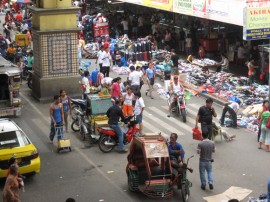
Quiapo, one of the famous market sites in the Philippines was named among the world’s 21 most notorious markets for pirated and counterfeit items by the Washington-based of the US Trade Representative (USTR).
Including the markets who was named as notorious by the USTR in the world are Bahia found in Guayaquil, Ecuador, China’s small commodities market in Yiwu, Luouwu market in Shenzen, Yangpu Yigao Digital Square in Shanghai, Ciudad del Este in Paraguay, PC Mall and Silk Market in Beijing, which are all found in China, Harco Glodok in Jakarta, Indonesia, Ladies Market in Mongkok, Hong Kong, La Salada in Buenos Aires, Argentina, Hong Kong; Petrivka in Kiev, Ukraine; Savelovskiy in Moscow, Russia; Panthip Plaza, Klong Thom, Saphan Lek and Baan Mor shopping areas, all in Thailand; San Andresitos, Colombia; Tepito in Mexico City; Nehru Place in New Delhi, India; and the Urdu bazaars in Karachi and Lahore, Pakistan.
USTR Agency in US is the one responsible for developing and coordinating the country’s international trade, commodities and direct investment policies.
Report was first posted in the website of the US emb(–foul word(s) removed–)y in Manila where USTR said that Quiapo was one of the examples of several locations and neighborhood in the Philippines that is known for counterfeiting different products and goods like clothing, shoes, watches and handbags.
On the Special 301 report on similar market by the USTR last year, they have mentioned Quipo and 168 Mall in Binondo Manila along with Greenhills and Makati Cinema Square in the cities of San Juan and Makati.
They have mentioned in the report that the streets Stalls found in Quiapo are one of the best example where you can find a lot of counterfeited clothes, shoes, watches, and handbags.
USTR also said that the unwillingness of the local investigation agencies and government authorities to confront stall owners are the reason why this problem cannot be resolved and officials are having a difficulty in obtaining meaningful enforcement action.
Despite the Executive Order released last 2006 forcing the landlords to established liability, still no landlords have reportedly prosecuted for Intellectual Property Rights (IPR) violations.”
